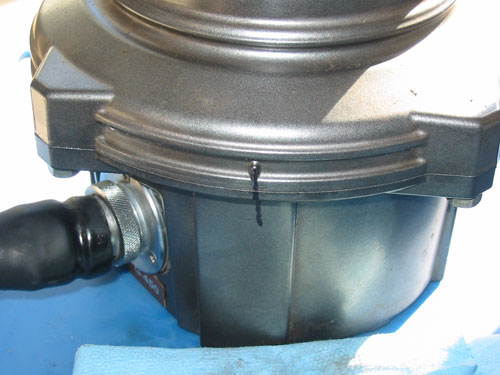43′ Vertical – Part 5 – Matching Network
43′ Vertical – Part 5 – Matching Network
Next on the list for the 43′ vertical project was the base matching network, to allow reasonable matching to the rig on all bands from 160 meters through 6 meters…
I started by mounting the 4:1 Unun from MFJ on a fiberglass plate, to give it good high voltage characteristics. This Unun is at a very high impedance point on 160 meters, so develops some very high voltages (up to 5000 volts or more, depending on power levels).
The Unun was attached with a 1/4″ x 20 screw through both boards, forming a sandwich. It is used to drop the high impedance down to a more manageable level on the ham bands. It basically divides the impedance at the antenna by 4.
Because the coil needs to be about 46 uh, it is too long to fit all in one piece. So it is cut in two sections and mounted seperately. By putting the two sections in series, the inductances still add up. There is about 54 uh total to work with…
I found a couple of really cool high voltage capacitors at Apache
Reclamation. Each is 0.02 uf, for a total of 0.04 uf. AD5X
recommends 3 0.01 uf , 3KV capacitors in parallel to handle full legal
power. I think the two that I have will work OK. They have a big
plate area to dissipate any heat generated in losses.
The caps are mounted in the top right, with the Unun mounted on the right side, and the two relays mounted in the middle.
The wiring is now substantially done, with the bias-T components on the terminal strip, and all of the RF wires run to the connectors and relays.
Next, I need to build the shack end of the bias-T to provide power through the coax to pull the relays in.
Here are the circuit diagrams in the various modes.
First is the 60-6 meter configuration:
On 80 meters, about 8.1 uh of the coil is used to match the base:
And on 160 meters, almost all of the coil is used (46 uh)…
Migrated Comments:










September 10th, 2010 at 2:53 pm
very nice site can i ask a question about the aade lc meter? larry
September 11th, 2010 at 11:09 am
Sure, Larry. I’ll try to answer your question about the aade lc meter. What’s up?
April 3rd, 2011 at 4:39 pm
Ranny,
Could you provide more information about the shack end of the bias-T to provide power through the coax to pull the relays in?
April 5th, 2011 at 4:59 pm
I’ll take some pictures of the shack-end bias-t and post some more detail this weekend.
December 3rd, 2011 at 1:23 pm
I liked it, may also make management of the cable
July 2nd, 2016 at 7:11 pm
Question on mounting the coils: Are those screws mounting the coil going through the sides of the box? I’m concerned that they’d develop high voltages. But I wasn’t crazy about AD5X’s hot-melt gluing the coil to the box interior, either.
July 3rd, 2016 at 6:29 am
Yes, the screws go all the way through. I’m not too worried in my case, as it is installed in a very remote location. But I can see where some might worry about it. Maybe use nylon screws, instead?
July 4th, 2016 at 3:35 pm
Thought about that, but there my concern is UV damage to the screws. Unless I can come up with some black nylon screws somewhere. If not, I’ll resort to good ol’ fashioned standoffs.
I’m not so concerned about shock hazards as shorting in wet weather.